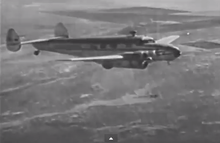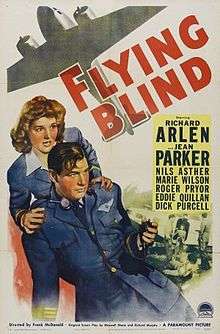Flying Blind (film)
| Flying Blind | |
|---|---|
|
Theatrical poster | |
| Directed by | Frank McDonald |
| Produced by |
William H. Pine (producer) John W. Rogers (associate producer) William C. Thomas (producer) |
| Written by |
Maxwell Shane (original screenplay) Richard Murphy (original screenplay) |
| Starring |
Richard Arlen Jean Parker Nils Asther Marie Wilson Roger Pryor Eddie Quillan Dick Purcell |
| Music by | Dimitri Tiomkin |
| Cinematography | Fred Jackman Jr. |
| Edited by | Robert O. Crandall |
Production company |
Picture Corporation of America Pine-Thomas Productions |
| Distributed by | Paramount Pictures |
Release dates |
|
Running time | 69 minutes |
| Country | United States |
| Language | English |
Flying Blind is a 1941 American action and comedy film directed by Frank McDonald and distributed by Paramount Pictures. The film was the second in a series of three Pine-Thomas adventure films that included Forced Landing (1941) and Submarine Alert (1943). The film stars Richard Arlen, Jean Parker, Nils Asther, Marie Wilson, Roger Pryor, Eddie Quillan and Dick Purcell.
Plot
After being fired for taking the blame for his co-pilot's incompetence, airline pilot Jim Clark (Richard Arlen) starts his own airline, Honeymoon Air, flying for weddings and divorces between Los Angeles and Las Vegas/Reno. He brings stewardess Shirley Brooks (Jean Parker) with him as a partner.[N 1] Jim is in love with Shirley, but has not asked her yet because of all the work in starting the new business. Shirley mistakes this for a lack of interest. Tired of waiting, she becomes engaged to another pilot, Bob Fuller (Dick Purcell). Jim is upset and arranges for Bob to go to Hackensack, New Jersey, for a phony job just to get him out of the way and prevent Shirley from marrying him.
Next, Jim and Shirley fly to Las Vegas with two newlywed couples: Veronica (Marie Wilson) and Chester Gimble (Grady Sutton), and Danila (Kay Sutton) and Eric Karolek (Nils Asther) (in reality, a spy named Colonel Boro). Joining them is their mechanic, Riley (Eddie Quillan), who is expecting to become a father any day. Jim is unaware that the Karolek couple are spies who work for Rocky Drake (Roger Pryor), attempting to steal a transformer used for a top-secret XB-62 bomber prototype. While the others are off celebrating, Drake meets his contact, gets the transformer and kills the man delivering it.
Drake sneaks aboard Jim's aircraft, flying back to Los Angeles. When Jim discovers the freeloader, he tries to turn the aircraft back to turn him into the police, but Drake forces him to continue. They fight over control of the aircraft. Shirley, not realizing it is for real, gives Drake's gun to Eric Karolek, who forces Jim to fly towards Mexico. On the way, the aircraft passes through a storm and starts shaking violently, causing an Allison V-12 engine block Drake brought aboard, to break loose, smashing instruments and engine controls inside the cockpit. Even with his engines shut down, Jim manages to land in the mountains.
While Jim and Drake try to repair the aircraft, Chester Gimble tries to call for help and fires off a signal flare, that lands in a nearby bush and sets it on fire. The fire comes closer and threatens them all, but soon the aircraft is ready to fly. Drake and the Karoleks try to commandeer the flight and a struggle ensues. In the end, Riley shoots and kills Drake. They all board the aircraft and Jim is able to take off.
Jim flies back to Las Vegas just in time to get the transformer back in place in the bomber before its test flight. Jim is the hero of the day, and he and Shirley go back to Los Angeles. When Bob comes back from New Jersey, upset because of the stunt Jim pulled on him, Shirley informs him that their engagement is off and that she instead plans to marry Jim.
Cast
- Richard Arlen as Jim Clark
- Jean Parker as Shirley Brooks
- Nils Asther as Eric Karolek/Colonel Boro
- Marie Wilson as Veronica Gimble
- Roger Pryor as Rocky Drake
- Eddie Quillan as Riley
- Dick Purcell as Bob Fuller
- Grady Sutton as Chester Gimble
- Kay Sutton as Miss Danila
- Charlotte Henry as Corenson's Secretary
- Joseph Crehan as Nunnally
- William Hall as Lew West
- Dwight Frye as Leo Qualen
- James Seay as Dispatcher
Production

Principal photography for Flying Blind took place from mid-June to early July 1941 at the Fine Arts Studios, Hollywood, California, and the Alhambra and Rosemead, California airports.[3]
Stock footage was used of a Boeing 247 and a Douglas DC-3 airliner with other flying scenes using a Lockheed 12A Junior Electra. Various light aircraft, including Arlen's Luscombe, were visible in the airport scenes, while Northrop A-17 bombers are at the military airport. [N 2]
Reception
Flying Blind was another in the series of B films churned out by the Pine-Thomas team. Along with flying scenes, the use of zany characters and slapstick efforts were juxtaposed with a spy story, as evidenced by the original tagline: "A plane-load of thrills ... as two lovers battle spies in the skies!"[5] The film villain was Swedish-born Nils Asther, who was featured in all three war adventures put out by William H. Pine and William C. Thomas.[6]
References
Notes
- ↑ The plot of Flying Blind was influenced by the real-life Paul Mantz Air Services (jokingly christened the "Hollywood Express"'), an air charter company owned and operated by Hollywood pilot Paul Mantz.[1]
- ↑ Arlen, a former World War I pilot, was able to fly his own aircraft in several scenes.[4]
Citations
- ↑ Dwiggins 1967, pp. 70-71.
- ↑ Wynne 1987, p. 172.
- ↑ "Original Print Information: Flying Blind (1941)." Turner Classic Movies. Retrieved: September 2, 2014.
- ↑ "Notes: Flying Blind (1941)." Turner Classic Movies. Retrieved: September 2, 2014.
- ↑ Farmer 1984, p. 136.
- ↑ "Later films 1941-1963." Nils Asther (1897 - 1981). Retrieved: September 2, 2014.
Bibliography
- Dwiggins, Don. Hollywood Pilot: The Biography of Paul Mantz. Garden City, New York: Doubleday & Company, Inc., 1967.
- Farmer, James H. Celluloid Wings: The Impact of Movies on Aviation. Blue Ridge Summit, Pennsylvania: Tab Books Inc., 1984. ISBN 978-0-83062-374-7.
- Wynne, H. Hugh. The Motion Picture Stunt Pilots and Hollywood's Classic Aviation Movies. Missoula, Montana: Pictorial Histories Publishing Co., 1987. ISBN 0-933126-85-9.
External links
- Flying Blind at the TCM Movie Database
- Flying Blind at the Internet Movie Database
- Flying Blind is available for free download at the Internet Archive
